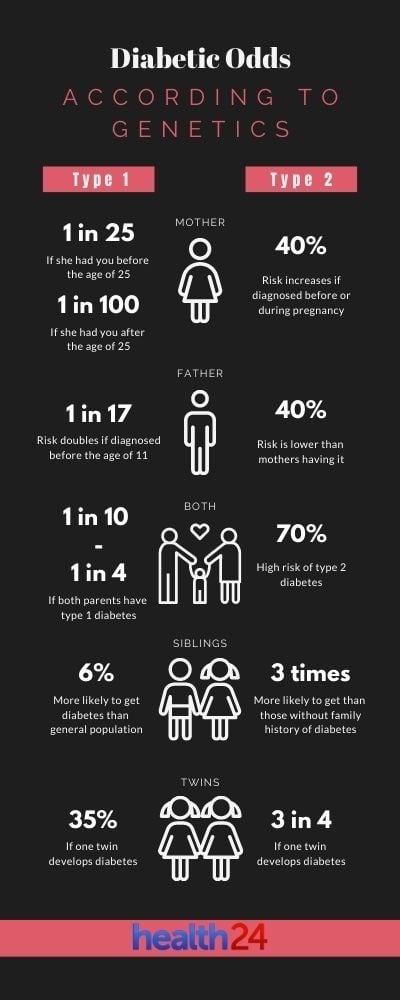- Your risk for diabetes increases if your parents and siblings have it
- The odds of getting it aren't the same for types 1 and 2
- While a healthy lifestyle is no guarantee, it still helps to avoid triggers
No matter how healthy your lifestyle might be, if diabetes runs in the family, you're susceptible to this insulin-related disease.
Both genetics and your lifestyle are risk factors when it comes to developing type 1 and type 2 diabetes at any age – and despite healthier living, the odds are against you if either one or both of your parents have diabetes.
READ | Technology can be a diabetic's best friend
Genes influence susceptibility
Scientists have collected a lot of evidence that more than 20 regions in the human genome contribute to type 1 diabetes susceptibility, an autoimmune disorder that normally presents in children. And the biggest influencer is the human leukocyte antigen (HLA) complex.
This system helps regulate your immune responses, but in the case of type 1 diabetes, it directs the body to attack the pancreatic beta cells that synthesise and secrete insulin.
For type 2 diabetes – which is a result of insulin resistance, and more common in adults – genetics plays an even bigger role. Studies have found that you're three times more likely to develop the disease if your parents or siblings have it, according to Dr Daksha Jivan, a physician and endocrinologist at the Charlotte Maxeke Johannesburg Academic Hospital.
Triggers
"Type 1 and type 2 diabetes are different diseases. In both, people inherit a predisposition to the disease, then something in the environment triggers it," says Jivan.
These triggers can include obesity, viruses, hygiene, nutrition and lack of exercise. In the pandemic age, doctors have also noticed that Covid-19 might be another trigger for the disease, and can also trigger deadly diabetic ketoacidosis, which makes it vital to stay up to date with insulin prescriptions during this time.
"Type 2 diabetes has a stronger link to family history and lineage than type 1 diabetes. Many genes are thought to be involved but they remain poorly defined."
READ MORE | Have diabetes? Don't lose sight of danger to your eyes
Diabetic odds
In South Africa, the prevalence of adult diabetes in the general population is 12.8% according to the International Diabetes Federation, with the highest prevalence among Asian and Coloured populations.
The country also has one of the highest rates of obesity in the world, which is a major trigger for diabetes, and can increase the risk of type 2 diabetes six times regardless of genetic risk.
But what are your odds if it runs in the family?
Infographic: Gabi Zietsman/Canva
Healthy lifestyle remains important
"Children that are overweight or obese, consume high-glycaemic index carbohydrate rich-food, refined sugar and flour products and high sugar carbonated drinks are more likely to develop type 2 diabetes earlier," adds Jivan.
Jivan also advises that if diabetes runs in the family, one should get tested at least annually after the age of 45.
"However, a wealth of data exists to show that type 2 diabetes may be significantly prevented or delayed by either healthy lifestyle modification, medication or both."
READ | Covid-19: Understanding the increased risk in people with diabetes
Image credit: Pixabay




 Publications
Publications
 Partners
Partners
















